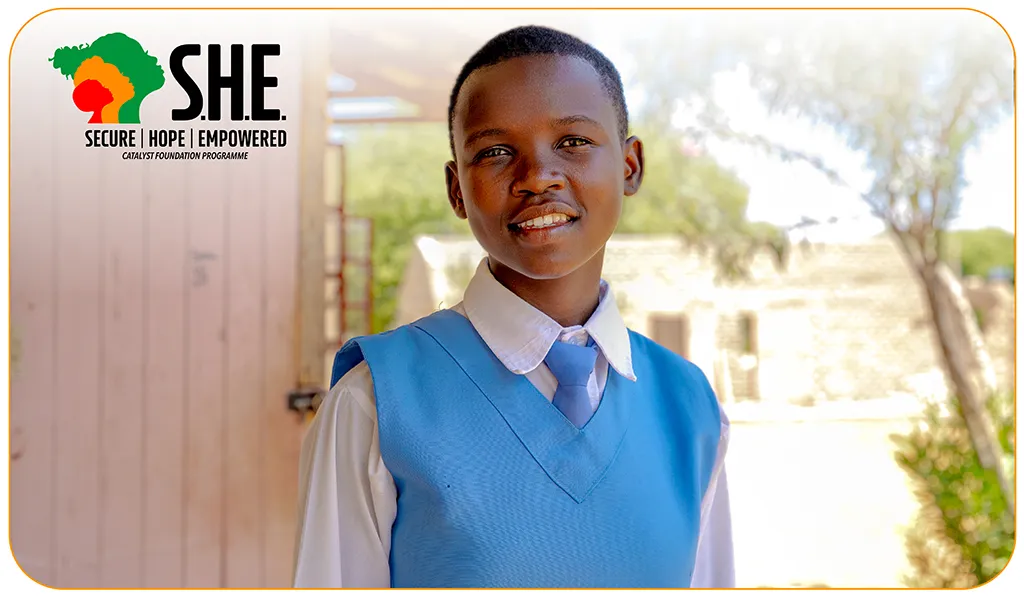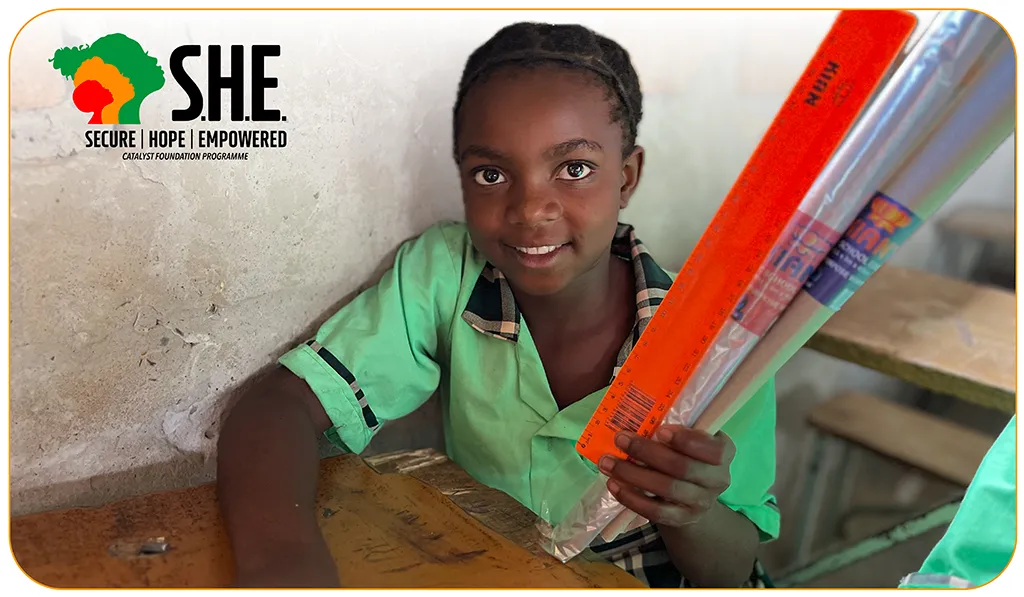Table of Contents
Introduction: The Unseen Burden
Imagine a fundamental biological process, essential to life, yet shrouded in silence, shame, and misunderstanding. For millions of women and girls worldwide, menstruation is not just a monthly cycle; it’s a source of stigma that impacts their education, work, health, and overall dignity. In rural and marginalized communities across Zimbabwe and Zambia, these stigmas are often amplified by cultural norms, lack of resources, and limited access to information, creating an unseen burden that holds back potential.
At Catalyst Foundation, we believe that menstrual health and hygeine are a human right and a cornerstone of gender equality. our S.H.E. (Secure, Hope, Empowered) Programme, we are committed to dismantling these pervasive stigmas, fostering open dialogue, and ensuring that every woman and girl can manage her menstruation with confidence and dignity, whether at school, at work, or in her home. This blog post will explore the profound impact of menstrual stigma and outline how collective action can create a period-positive future for all.
The Silent Burden: Understanding Menstrual Stigma
Menstrual stigma manifests in various forms, from cultural taboos and myths to a pervasive lack of open conversation. This silence often leads to:
- Shame and Embarrassment: Girls and women may feel ashamed of their periods, leading them to hide products, avoid discussions, and even isolate themselves.
- Misinformation and Superstition: Without accurate education, harmful myths about menstruation being “unclean” or “cursed” can persist, leading to discriminatory practices.
- Lack of Access: Stigma contributes to the neglect of menstrual health as a public health issue, resulting in inadequate facilities and unaffordable or unavailable menstrual products.
- Psychological Distress: The constant fear of leakage, judgment, or ridicule can cause immense anxiety, stress, and even depression.
These societal attitudes create a cycle of disadvantage, particularly in communities where resources are already scarce. Our S.H.E. Programme, directly addresses these challenges by providing education and resources that combat misinformation and improve access, thereby reducing shame and distress.
Stigma’s Shadow: Impact on Schools
For a young girl, school should be a place of learning, growth, and opportunity. However, menstrual stigma often turns it into a source of anxiety and absenteeism.
- Missed Education: When girls lack access to sanitary pads or proper sanitation facilities, they often miss school days during their periods. This absenteeism leads to falling behind academically, reduced performance, and, tragically, an increased likelihood of dropping out altogether. In many rural areas of Zimbabwe and Zambia, this is a stark reality, hindering girls from completing their education and securing a brighter future. The S.H.E. Programme actively works within these schools to provide essential menstrual products and advocate for improved facilities, ensuring girls can attend class without interruption.
- Reduced Participation: Even when present, discomfort from inadequate products, fear of leaks, or the inability to manage hygiene discreetly can make girls hesitant to participate in class, sports, or social activities. This impacts their confidence and overall school experience. Through our S.H.E. Programme’s workshops, girls gain confidence and knowledge to manage their periods discreetly and comfortably, encouraging fuller participation.
- Bullying and Isolation: Misunderstanding and stigma can lead to teasing or exclusion by peers, further isolating girls during a vulnerable time. Our S.H.E. Programme conducts awareness sessions for all students, including boys, to foster empathy and dismantle misconceptions, creating a more inclusive school environment.
Breaking this cycle in schools is crucial for achieving educational equality and empowering the next generation of female leaders.
Breaking Barriers: Menstrual Health in the Workplace
The challenges don’t end with school. Women in the workforce also face unique hurdles related to menstrual health, often silently.
- Productivity and Focus: Pain, discomfort, and the stress of managing menstruation discreetly can significantly impact a woman’s focus and productivity. Without supportive policies or understanding colleagues, this burden falls entirely on the individual.
- Lack of Facilities: Many workplaces, especially in marginalized areas, may lack clean, private restrooms with proper waste disposal facilities, making menstrual hygiene management difficult and undignified.
- Professional Stigma: There’s often an unspoken expectation for women to hide their periods, fearing that acknowledging menstrual discomfort might be perceived as weakness or unreliability, potentially affecting career progression. This leads to women enduring pain and discomfort in silence. Through public awareness campaigns, we aim to normalize conversations around menstruation, reducing professional stigma and fostering a culture of acceptance.
Creating period-friendly workplaces is not just about health; it’s about fostering an inclusive environment that values all employees and supports their well-being, leading to a more productive and equitable workforce.
Fostering Openness: The Role of Homes and Communities
The roots of menstrual stigma often lie deep within homes and communities, perpetuated by generations of silence and cultural taboos.
- Lack of Open Dialogue: In many households, menstruation is a forbidden topic, leaving young girls unprepared and uninformed. This lack of communication can lead to fear, anxiety, and a sense of isolation when they first experience their period. The S.H.E. Programme facilitates community dialogues and parent workshops to encourage open and positive conversations about menstruation within families.
- Cultural Practices and Myths: Certain traditional beliefs can reinforce negative perceptions of menstruation, leading to restrictions on girls’ activities, diet, or social interaction during their periods. These practices, while often well-intentioned, can be disempowering. We work respectfully with community leaders to address and challenge harmful cultural myths through education and awareness.
- Male Involvement: A significant barrier is the lack of understanding and involvement from men and boys. When menstruation is seen as solely a “women’s issue,” it perpetuates silence and prevents a holistic community approach to menstrual health. Our S.H.E. Programme actively engages men and boys as allies, educating them on the importance of menstrual health and their role in supporting women and girls.
Changing these deeply embedded norms requires sensitive, consistent education and community-wide engagement, which is a core focus of our work as Catalyst Foundation.
Catalyst for Change: How Catalyst Foundation is Making a Difference.
At Catalyst Foundation, we are actively working to break down these stigmas and create a supportive environment for women and girls in Zimbabwe and Zambia through our S.H.E. Programme and other initiatives. Our approach is multi-faceted:
- Comprehensive Education: We conduct workshops in schools and communities, providing accurate, age-appropriate information about the menstrual cycle. We empower girls with knowledge about their bodies, hygiene practices, and self-care, dispelling myths and fostering confidence. Crucially, we also engage boys and men to promote understanding and empathy, transforming them into period allies.
- Access to Products and Facilities: We work to ensure access to affordable or free menstrual products and advocate for improved sanitation facilities in schools and public spaces. This practical support directly addresses period poverty, a major driver of stigma and absenteeism, ensuring girls can attend school and women can work without interruption.
- Teacher and Leader Training: We train teachers, community leaders, and health workers to become champions of menstrual health, equipping them to educate others and create supportive environments within their spheres of influence.
- Advocacy and Awareness Campaigns: We run dynamic campaigns to raise public awareness, challenge harmful stereotypes, and encourage open dialogue about menstruation. We use storytelling to humanize the issue and highlight the resilience of girls and women, shifting societal perceptions.
Our goal is to create a future where no girl in Zimbabwe or Zambia feels ashamed of her period, and every woman can thrive without the burden of stigma.
A Collective Call to Action: Your Role in Ending Period Stigma
Breaking down centuries-old stigmas is a monumental task, but it’s one we can achieve together. We invite individuals, corporations, and organizations in Zimbabwe and Zambia, and globally, to join us in this vital mission.
- Educate Yourself and Others: Share accurate information. Challenge myths. Speak openly and positively about menstruation.
- Advocate for Policy Change: Support initiatives that promote access to menstrual products, improve sanitation, and integrate menstrual health into public health policies.
- Support Us: Your financial contributions enable us to expand our educational programs, provide essential products, and reach more marginalized communities. Every donation, big or small, makes a tangible difference in a girl’s life.
- Become a Corporate Partner: Companies in Zimbabwe and Zambia have a unique opportunity to demonstrate corporate social responsibility by sponsoring menstrual health initiatives. Investing in girls’ menstrual health is an investment in a healthier, more productive workforce and a more equitable society.
- Volunteer Your Time: Lend your skills and passion to support awareness campaigns, workshops, or distribution efforts.
By investing in menstrual health, you are investing in dignity, education, health, and the empowerment of women and girls, fostering a ripple effect that strengthens entire communities.
Towards a Period-Positive Future
The journey to a period-positive future is ongoing, but with increased awareness, education, and collective action, we can break the chains of menstrual stigma. Every conversation, every donated pad, every supportive policy brings us closer to a world where menstruation is no longer a barrier, but a natural aspect of life celebrated with dignity and respect. Join Catalyst Foundation in writing this new chapter for girls and women in Zimbabwe and Zambia. Let’s empower them to embrace their bodies, pursue their dreams, and lead without shame.



